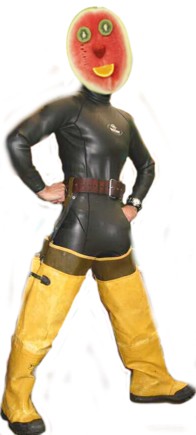Bootleg

Bootlegs, also known as "legs with boots on them" or "Bertie," are the world's cleanest, most renewable energy source. Replacing solar energy, wind power, Bacon in a Bottle, and incontinent poodle emissions as the foundation of the U.S. Republican Party's Alternative Energy Plan, bootleg research has already yielded amazing results in a variety of areas, including aerospace, weapons development, iPod rechargeability, and in the manufacturing of dangerous pharmaceuticals for small children.
History[edit | edit source]
Bootlegs were first discovered in 1952 during an exhaustive study by MIT scientist Robert Yoohooschmooza, during which he noticed - by sheer coincidence - that his shirt was stained in two specific places each night when coming home from gymnastics training. After publishing his findings in the Journal of Embarrassing Physiognomy, Yoohooschmooza won the Nobel Prize for Uncomfortable Bodily Regions, and later founded the Alliterative American Armpit Awareness Association of America And Algeria (AAAAAAAA). Needless to say, Yoohooschmooza forgot all about bootlegs, leaving others to continue his work in the area, as well as his telephone service at his secret kinky-sex hideout in New Jersey.
In 1997, Yoohooschmooza died of strangulation when the hair growing out of his boots deliberately strangled him during a bitter custody dispute over Yoohooschmooza's Ferrari. He was 14 years old.
Important Milestones[edit | edit source]
- 1969: During the Summer of Love, many "hippies" removed their boots for television cameras, revealing their bare legs. The shockingly graphic nature of this footage led to the decision to place warning labels on all television sets sold until 1973, when leg-exposure became mandatory as a result of Richard M. Nixon's successful reelection.
- 1985: The United Kingdom made it illegal for New Wave bands to wear pants, leading to the age of Post-Punk.
- 1999: Post-Punk became illegal in the UK when a Member of Parliament accidentally brushed a soiled diaper against an important piece of legislation.
Unimportant Rolling Stones[edit | edit source]
It is very difficult to determine which of the Rolling Stones was the least important. One might argue that Brian Jones, due to his early death, was perhaps the least productive member, but ultimately, Ron Wood must be considered the least influential, and therefore the least important. At least Charlie Watts had Shirley. However, as the band's drummer, Watts' legs (and boots) were often the most unpleasant to be around after a typical concert appearance. This led to his receiving less attention from attractive female fans than the other Rolling Stones, which hurt him deeply in a complex, emotional way, and led to the publication of Richard Dawkins' groundbreaking work on neo-Darwinian genetics, The Selfish Prick.
Unimportant People Getting Stoned[edit | edit source]
Tom Freenery, an unemployed man living with his parents in Kansas City, is often credited with having smoked three marijuana cigarettes, or "joints," last night. These cigarettes produced a soporific, mildly disorienting effect, which allowed Freenery to temporarily forget the intense desperation of his personal situation.
Harriet Klein, a wealthy, successful, respectable businesswoman in her mid-thirties, joined Freenery for several hours during this particular binge, for no other reason than she had forgotten her hair net that evening and felt it unfair that she should have to purchase another one from Wal-Mart.
It was later discovered that neither of these persons owned any bootlegs at all, and were in fact using complex hydraulic machinery to remove their boots and toss them about, seemingly for no logical reason whatsoever. (The affair is still under investigation.)
What The Hell Were We Talking About?[edit | edit source]
Bootlegs? Yeah, like I remember.